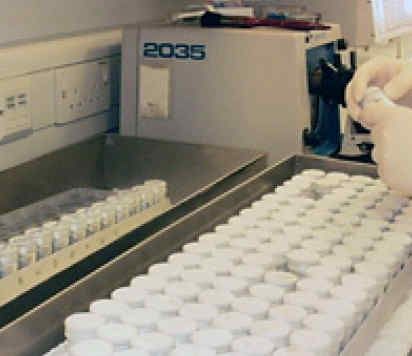What type of samples can I collect using the Tissue Bank's generic consent materials?
Human samples can only be obtained with consent from the donor. Please see the current version of the ICHTB Information for Patients, Relatives and Carers Version 7 - Read only (PDF). Printed copies of this booklet can be obtained via the Tissue Bank. These forms may only be used to consent patients treated at Imperial College Healthcare NHS Trust - they cannot be used in other NHS Trusts.
Our current REC approval permits the collection and storage of the following samples:
- Fresh, frozen and processed material (FFPE)
- Extra samples from patients undergoing diagnostic tests
- Blood samples or non-invasive samples from healthy volunteers
- Non-invasive samples from patients scheduled for an operation or biopsy procedure
- Xenograft studies
Fresh, frozen and processed material (usually fixed in formalin and embedded in paraffin) sampled from operative specimens obtained from patients operated on in ICHT. Fluid samples (ascites, pancreatic fluid etc) taken from a diagnostic or operative intervention.
Please see the following SOP for Recording Consent for Leftover Tissue (PDF) from a procedure for more information on how consent must be sought and recorded from patients to obtain these types of samples.
Extra samples are taken for research from patients undergoing diagnostic tests (e.g. blood samples or biopsy samples).
These samples are taken at the same time as the rest of the tissue is being taken for diagnosis. See the SOP for Recording Consent for Extra Tissue (PDF) of fluid or biopsy material for information on how consent must be sought and recorded from patients to obtain these types of samples.
Blood samples or non-invasive samples (breath, sweat, urine, faeces or saliva) from healthy volunteers.
If you wish to collect samples from healthy volunteers you must first make an application to the Imperial College Research Ethics Committee (ICREC) via the ICREC application form. Projects that collect samples from Imperial staff and students using Tissue Bank approved consent materials go through an expedited review with ICREC. Prior to sending the application to ICREC please send the completed form to your Head of Department and ask them to complete the relevant box. The Head of Department has the right to approve the proposal or to ask ICREC to consider the proposal at their next meeting. Once the Head of Department has approved your project, you can then apply to host a sub-collection with the Tissue Bank. The ICREC form with the Head of Department approval must be uploaded as part of your application to host the sub-collection. Tissue Bank will then provide you with a letter of conditional approval that can be submitted with your application, signed by your Head of Department to jrcocoordinator@imperial.ac.uk.
In order to finally approve your sub-collection your approval letter from JRCO must be sent to tissuebank@imperial.ac.uk. The Tissue Bank team will then issue a formal approval letter and you can then start collecting your samples. Remember that you must also register a project before your samples can be used for research. Applications to access samples can be made electronically via the Tissue Bank database. If you are already registered as a user of the database you will see "Apply for access to samples" on the left-hand side menu bar. Click on this to start your application. If you are not yet a registered user, please email the Tissue Bank to obtain a user name and password. The Healthy Volunteers sub-collection flowchart summarises the procedure.
For more information on how consent must be sought and recorded from healthy volunteers, please see the SOP for Recording Consent for Healthy Volunteers (PDF). Please contact the Tissue Bank for more information.
Non-invasive samples from patients scheduled for an operation or biopsy procedure.
For information on how consent must be sought and recorded to obtain these types of samples, please see figure 1B and 1C in the SOP for Recording Consent for Extra Tissue (PDF), fluid or biopsy material.
If you wish to collect samples for use in xenograft studies, a very specific extra consent is required from the donor. For more information on xenografting, please see the SOP for Recording Consent for Xenografting (PDF).
